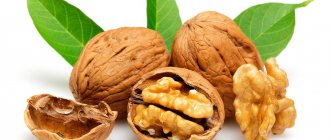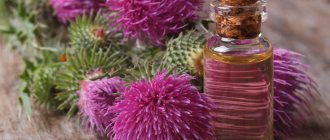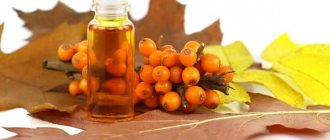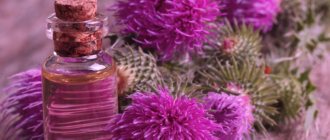Rosemary oil (English: Rosemary oil, Latin: Rosmarinus oleum) is an essential product that is made from rosemary shoots. This evergreen shrub grows in western Europe, northern Africa and partly on the Balkan Peninsula. A special method of obtaining oil by water-steam distillation allows you to create the most concentrated liquid and preserve the beneficial properties of the plant. The final product is often added to perfume compositions, used in aromatherapy, as well as for skin and hair care.
Rosemary essential oil
Rosemary essential oil is native to the Mediterranean region. Back in the 14th century, it was used to fight evil spirits, which at that time were considered the main cause of all diseases. After using it, people note a significant improvement in their skin condition, absence of headaches and other positive changes. Now the main producers of the oil are pharmaceutical companies in Tunisia and Spain.
Now Foods has been demonstrating high quality products for over 50 years . Manufacturers offer rosemary essential oil “Essential Oils, Rosemary” (1 fl oz, 30 ml). The product contains natural undiluted plant oil and is therefore highly concentrated. Its effect is aimed at cleansing the body and improving mood. Aromatherapy with oil is no less useful: it tones and calms the nervous system.
Recommendations for use:
- Do not use pure product.
- For aromatherapy, mix with carrier oils: jojoba, olive, grape seed or almond.
General description and composition of rosemary oil
Rosemary is an evergreen shrub of the Lamiaceae family. This plant can be found in Western Europe, Africa and some countries of the Balkan Peninsula.
Rosemary oil is obtained using water-steam distillation. This liquid is a saturated ether. The concentration of nutrients in it is several times greater than in a fresh plant.
Rosemary oil contains:
- terpene alcohols, terpenoids (camphor, pinene, cineole);
- vitamins A, C and almost the entire group B;
- polyunsaturated acids;
- potassium;
- calcium;
- zinc;
- iron;
- tannins;
- organic resins.
Rosemary oil is light yellow in color, thick and viscous, with a mostly uniform consistency. During long-term storage, the liquid may darken, and a slight sediment may sometimes be visible at the bottom. The essence has a characteristic herbaceous-spicy smell, in which camphor notes are clearly felt.
Rosemary concentrate can be used alone or together with other esters. It is often mixed with almond, argan, grape and other oils.
To aromatize rooms, you can combine it with citrus esters. For cosmetic purposes, it is better to add the essence to base oils (olive, grape seed).
View this publication on Instagram
Publication from Slings, Ergo-backpacks, for mothers (@vsemamamkld) Sep 16, 2017 at 10:47 PDT
Rosemary oil: composition
Not every aroma product has such a rich chemical composition as rosemary oil . This provides its beneficial properties and makes it popular among buyers. The oil contains the following components:
- terpene alcohols and their derivatives terpenoids (α- and β-pinenes, borneol, camphene, camphor, cineole, bornyl acetate and others);
- vitamin A, vitamin B3, vitamin C and other B vitamins;
- saturated fatty acids;
- microelements (potassium, calcium, iron, magnesium, zinc);
- tannins;
- bitterness and resin.
It is worth noting that rosemary essential oil consists of 10% water, which makes it very light and quite fluid in consistency. By consuming it internally, you don’t have to worry about calories: 100 g of the product contains a little more than 300 kcal.
Rosemary oil: general characteristics
Rosemary essential oil is obtained from the leaves, buds and flowers of this evergreen shrub, which is native to the Mediterranean coast. The main suppliers of this product are France, Spain and Tunisia. In appearance it is a colorless liquid, but a yellowish tint is also acceptable. The oil has a rather strong, pungent, spicy taste and smell. With prolonged storage, it becomes thicker and darker.
The history of rosemary use goes back several thousand years. Even in Ancient Egypt, this plant was treated as a shrine. They fumigated rooms with it, giving it the ability to drive out evil, and used it to treat many diseases. The disinfecting properties of rosemary were especially valued. In the Middle Ages, it helped fight epidemics and was also used to increase the shelf life of food. There is a legend that Queen Elizabeth of Hungary used a special emulsion that included rosemary to maintain her beauty. It is believed that the essential oil from this plant first appeared thanks to the experiments of the alchemist Raymond Lull in the 14th century.
Rosemary oil is rightfully considered one of the best esters that activate the internal forces of the body.
The chemical composition of the oil is as follows:
- α- and β-pinenes (30%);
- camphene (20%);
- borneol (10-17%);
- cineole (10%);
- camphor (7%);
- bornyl acetate (2%);
- limonene;
- myrcene;
- dipentene;
- verbenone;
- linalyl acetate;
- potassium;
- calcium;
- copper;
- zinc;
- iron;
- selenium;
- phosphorus;
- sodium;
- potassium;
- vitamins A, E, C, K, B, PP.
During the study of the effect of esters on the human body, the following properties of rosemary oil were identified:
- painkiller;
- antispasmodic;
- tonic;
- stimulating the activity of the nervous system;
- disinfectant;
- activating blood circulation;
- regenerating;
- increasing sexual desire;
- improves mood and general mental state.
How to choose and store the product correctly
The main method of obtaining essential oils, including rosemary, is the method of water-steam distillation. In this case, the first-grade product is produced from the first parts of the distillate. This oil has extra status; it retains the maximum amount of nutrients. Preference should be given to this particular method. The last distillation produces a lower grade product.
You should purchase oil in pharmacies or specialized stores, paying attention to the expiration date. It must be stored in a hermetically sealed container, away from sunlight. The optimal temperature is 20–24 °C.
Contraindications for use
Rosemary essential oil has the following contraindications:
- individual reaction to components;
- pregnancy;
- age up to 7 years;
- hypertension (as the drug can increase blood pressure);
- epilepsy;
- convulsive syndromes.
Rosemary oil is not recommended for use for cosmetic purposes before going out in the sun.
Video: unique properties of rosemary
Rosemary oil: properties
Rosemary oil has both pronounced properties and hidden ones that few people know about. First of all, it affects certain areas of the brain and increases blood circulation, thereby improving memory. This quality is confirmed by many historical sources. It is known that in Greece, students wore rosemary jewelry to increase mental alertness and pass exams, and scientists used it to memorize foreign words.
Other, but no less important properties of rosemary essential oil :
- It is a natural pain reliever and effectively relieves headaches. But, unlike ready-made medications, it does not cause sleep disturbances, but tones the body.
- Capable of killing pathogenic bacteria and preventing their reproduction. This strengthens the body’s defenses, and it begins to fight the infection on its own.
- Positively affects the functioning of the digestive system. Namely, it replenishes the deficiency of gastric juice, relieves inflammation of the gastric mucosa and inhibits the proliferation of pathogenic microorganisms.
- Accelerates the restoration of damaged tissues.
- The aroma of rosemary oil helps to avoid mental disorders such as depression, emotional exhaustion and simply lack of mood.
- It briefly increases blood pressure, thereby normalizing blood circulation to all vital organs.
- Increases sexual desire.
- It has anti-sclerotic properties and reduces cholesterol levels in the blood.
- Relieves cough.
According to chemical indicators, the oil has a yellow tint or no color at all. The smell is pungent and very strong, and after internal use the aftertaste of herbs remains in the mouth. Don't worry if the product becomes viscous and darker over time: this is a natural process during storage.
Properties of rosemary oil
The required result in the treatment of various diseases and in the process of hair and skin care is ensured thanks to the large number of useful substances in its composition. If you plan to use rosemary essential oil, the properties of the product should be studied before starting the course of treatment.
Among them:
- memory improvement;
- stimulation of mental performance;
- increased concentration;
- antibacterial effect;
- activation of the process of removing excess fluid from the body;
- reducing the intensity of inflammation;
- antioxidant effect;
- tissue regeneration;
- analgesic effect;
- restoration of mental health.
Rosemary oil is used for cosmetic and therapeutic purposes.
Benefits and therapeutic effects
Beneficial properties are manifested due to the composition of rosemary oil:
- Pinenes are biological compounds found in large quantities in the spicy plant. Their concentration in the oil is 30%. These components act as a catalyst for the synthesis of various substances.
- Cineole - exhibits antiseptic and mucolytic properties.
- Camphor - a substance normalizes the functioning of the respiratory system, vasomotor center, improves the condition of the heart muscle, while increasing its sensitivity to the sympathetic nerves. Under its influence, blood vessels narrow, platelet aggregation slows down, thereby reducing the risk of blood clots. Thanks to these properties, microcirculation in the affected areas is restored. At the same time, antipruritic properties appear, which is due to the effect of the substance on cold receptors.
- Vitamin A. This is a fat-soluble compound, so when it enters the body along with oil, its synthesis is activated. Thanks to this substance, immunity is increased and tissue growth is activated, since the vitamin is involved in the construction of cell membranes. There is an effect on various processes: the synthesis of hormones and enzymes, the development of muscle and connective tissue, cartilage. Thanks to vitamin A, the intensity of metabolic processes of various useful substances increases, vision and skin condition improve.
- Vitamin B1. Takes part in the metabolic processes of proteins, fats, carbohydrates. Accumulates in the tissues of organs (heart, brain, liver, kidneys), improves their functioning. The substance maintains the condition of the nervous system, increases appetite, affects muscle development, prevents the occurrence of diseases of the gastrointestinal tract, normalizes memory and mental performance.
- Vitamin B2, or riboflavin. With its participation, the condition of the skin improves, the substance also accelerates the healing of wounds, supports the function of the visual organs and the gastrointestinal tract. Vitamin B2 is necessary for diabetes, anemia, and severe liver pathologies. Thanks to it, blood cells are formed, the function of the reproductive system is normalized, the growth of nails and hair is accelerated, and the functioning of the thyroid gland is stabilized.
- Vitamin B3. The substance takes part in redox processes, thanks to which proteins, carbohydrates and fats are converted. The vitamin helps normalize the function of the central nervous system and muscles, provides tissue nutrition, and improves the functioning of the digestive tract. With the participation of this substance, tissue respiration improves.
- Vitamin B5, or pantothenic acid. It is converted to pancreatin, in this form it affects metabolic processes. Vitamin B5 is involved in the synthesis of cholesterol, hemoglobin, histamine and other important substances. With its participation in a number of processes, an improvement in the condition of hair and skin is noted. Coordination of movements is restored, the functioning of a number of internal organs, for example, the heart, kidneys, and stomach, improves. When the body has enough of this vitamin, the acidity of gastric juice decreases.
- Vitamin B6, or pyridoxine. Thanks to this substance, formed blood elements (erythrocytes) are produced, the nervous system functions better, because cells quickly absorb glucose. With its participation, fats and proteins are exchanged, amino acids are transformed, and liver function is normalized.
- Vitamin C. This is a natural antioxidant involved in most biochemical processes. Thanks to it, the function of connective and bone tissues improves. Vitamin C affects the circulatory system and helps eliminate the symptoms of hemorrhagic diathesis. The following factors contribute to this: normalization of blood viscosity, strengthening of capillary walls. Ascorbic acid increases the body's immunity and resistance to viruses and bacteria, supports the functioning of the liver and gastrointestinal tract.
- Vitamin E. Protects cell membranes from negative factors, exhibits antioxidant properties, stabilizes blood pressure. Thanks to it, the risk of developing cancer is reduced and cholesterol levels in the blood are normalized. With the participation of this substance, the synthesis of a number of substances in the body occurs, for example, nucleic acids, hemoglobin, etc.
- Vitamin K. It is also necessary for the normalization of protein synthesis, promotes the growth of connective and bone tissue, and supports kidney function. With its participation, calcium and vitamin D are absorbed.
There are also minerals in rosemary oil, such as calcium, sodium, potassium, copper, iron, zinc, magnesium, manganese.
In addition, this ester is a source of phytosterols. This is the name given to substances of plant origin that are similar in structure and properties to the cholesterol molecule, but have a better effect on the body. Phytosterols help prevent the development of vascular diseases, atherosclerosis, and improve blood supply to organs and tissues.
The beneficial properties of rosemary oil are due to the rich composition of the ether.
The oil also contains the following components:
- tryptophan - increases life expectancy, is distinguished by the ability to absorb electromagnetic radiation and affects the synthesis of useful substances;
- threonine - participates in the formation of proteins;
- lysine is an amino acid present in proteins; when it is deficient, a pathological condition such as immunodeficiency develops;
- valine is also a component of proteins, participates in energy metabolism, maintains serotonin levels, improves the functioning of muscle tissue, and helps reduce sensitivity to pain.
Harm and contraindications
Considering that essential oil is recommended for external use, its only drawback is more pronounced - the occurrence of headaches when using a large dose of ether. If you plan to use products based on it, not only the medicinal properties are studied, but also the contraindications.
The latter include:
- epilepsy;
- tendency to seizures;
- hypertension;
- children under 7 years of age;
- individual intolerance to active components.
You should not apply rosemary ether to your skin before leaving home in sunny weather.
If rosemary oil is considered for the treatment and prevention of diseases, its use is limited by relative contraindications. These include periods of pregnancy and lactation. In these cases, you can use products based on rosemary ether only after consulting a doctor.
In addition, there is a ban on external use of the product before going outside in sunny weather, because When rosemary oil is applied to the skin, the risk of severe burns increases. The ether has photosensitizing properties, which increases the skin's sensitivity to ultraviolet rays.
Rosemary oil: application
Rosemary oil is used in both classical and alternative medicine. Its properties are useful in cosmetic procedures, aromatherapy, and in addition, they have found application in the treatment of problems with internal organs.
Rosemary essential oil is used in the following cases:
- inflammation of the skin, dermatological diseases, healing of scars and cicatrices;
- headaches, acute and chronic pain in the heart muscle and other organs;
- insomnia, depression (grapefruit and orange oil also helps);
- muscle fatigue;
- unstable blood pressure;
- tissue damage accompanied by pathological processes (for example, rheumatism);
- excess cholesterol;
- lack of potency in men;
- early toxicosis in pregnant women.
The pleasant smell of rosemary oil is indispensable in aroma lamps, baths, and used for therapeutic massages. It acts as a calming agent for the nervous system and also balances the emotional state. A person gets rid of psychological problems and feels more confident.
Contraindications
Rosemary essential oil is a potent substance and therefore has contraindications.
You should not use the product:
- pregnant women;
- for allergy sufferers;
- epileptics;
- hypertensive and hypotensive patients;
- infants and nursing women;
- people with frequent muscle cramps.
Before using the product, perform a sensitivity test. Do not use the product if your skin itches, redness or other unpleasant symptoms appear.
Do not apply the product to the skin in its pure form; only the product diluted in the base has a beneficial effect. Any vegetable oil is suitable as a base; olive oil is popular. Do not get the product into your eyes. The active ingredients irritate the mucous membranes.
You may be interested in an article about treating neurasthenia at home.
There is also a useful article about what to do if your fingers go numb.
Here you will learn about the treatment of cholelithiasis with folk remedies.
Rosemary oil: for hair
Rosemary oil is often added to shampoos and hair masks. It normalizes the production of sebum, due to which the pores open, the growth of hair follicles accelerates and their quality improves. Other changes you may notice:
- hair becomes elastic and shiny;
- their structure is strengthened, so there are significantly fewer lost hairs on the comb;
- the problem of dandruff is solved;
- the freshness of the hair is maintained for a long time;
- damaged hair looks healthy and well-groomed.
You can prepare several effective masks with rosemary oil
- To get rid of hair loss, you need to combine rosemary oil with burdock oil. If this is not possible, it is replaced with castor oil. The main remedy is a few drops per 1 tbsp. extra oil. Apply the finished mask to your hair and leave for half an hour. Then wash the remains thoroughly with your usual shampoo.
- Dry hair will be reduced by a mask made from other ingredients. Mix 2-3 drops of rosemary oil , 1 egg yolk and 2.5 tbsp. almond oil Apply the mixture to your head and rinse after 30 minutes.
Thanks to the fact that the oil improves cellular nutrition and normalizes metabolism, girls soon forget about their hair problems. But, if the scalp is too sensitive, you should abandon this treatment and use other products instead of oil: amla or pomegranate extract.
Energetic and magical properties of rosemary oil
Rosemary has been endowed with magical properties since ancient times. Many people still believe in the energetic power of this plant. It is believed that the aroma of rosemary prevents negative energy from destroying a person’s aura and has a protective function, protecting against evil and the evil eye. This plant is called a “cure for laziness”, and deservedly so. The tonic effect of rosemary ether has been proven and is actively used in aromatherapy against depression, apathy and loss of strength.
Even in ancient times, rosemary was credited with magical properties; they fumigated rooms with it to get rid of negative energy, evil and damage.
The main sphere of influence of rosemary is considered to be intellect. Even in Ancient Greece, they wore wreaths from this plant. It was believed that in this way one could improve memory and concentrate all attention on mastering new knowledge. There is an opinion that the aroma of this plant gives self-confidence, helps to overcome life's difficulties, and returns interest in life.
In addition, rosemary is a powerful aphrodisiac; aromatherapy using it increases sexual attractiveness.
Rosemary oil: for face
The main area of application of the essential product is cosmetology. Rosemary oil reduces skin oiliness, tightens pores and cleanses them of sebum. Gradually, the top layer of skin smoothes out and becomes elastic. This affects the appearance: the woman looks young, possible skin problems are practically invisible.
The product has another effect on dry skin:
- peeling is eliminated;
- the rough epidermis softens;
- the feeling of tightness disappears.
Important! Rosemary oil contains many chemical elements, including calcium. It activates the production of collagen - the main protein of strong and elastic skin.
Recipes for masks based on this ether are varied. In addition to the main component and base oil, egg yolk is added to the mixture. The maximum time for using masks is half an hour, so as not to cause irritation. Another way to use it is to add a couple of drops to a rich face cream and smear it on your skin before going to bed. 2-3 drops are enough for a standard jar.
The beauty of the skin must be protected and this can be done not only with the help of rosemary oil . Manuka honey, horny goat weed, ubiquinol and fish oil are so beneficial for the epidermis.
Use in cosmetology
The antibacterial and regenerating properties of rosemary are used in face and hair care. The essential remedy is effective in treating oily and problematic skin.
The substances in the essential product reduce skin oiliness, tighten pores, and even out the skin. Rosemary oil is also used for dry and sensitive skin. It softens the epidermis, tightens the skin, and makes it elastic.
We recommend reading: Tabex: instructions for use for quitting smoking
The active components of the plant promote weight loss and reduce the appearance of cellulite in the early stages. It is not surprising that this oil is included in many anti-cellulite products.
For face
Cosmetics with essential oils eliminate many problems:
- relieves inflammatory processes on the skin;
- heals scars, age spots, small scars;
- whitens the face;
- tones and rejuvenates.
Making effective cosmetics couldn't be easier. The use of rosemary consists of mixing a few drops of this product with any vegetable oil.
Mask for oily and problem skin:
- rosemary oil - 2 drops;
- grape seed oil - 1 tablespoon.
Mix the two ingredients and apply the composition to a previously cleansed face. Leave the mixture for half an hour, then blot the residue with a napkin or wash with water at a comfortable temperature. Do the mask twice a week.
Anti-acne remedy:
- black cumin - 1 teaspoon;
- rosemary oil - 2 drops.
Mix both components and apply to inflamed areas. It is convenient to do this with a cotton swab several times a day until acne and other rashes go away.
Rosemary in face masks prepared at home saturates the skin with beneficial components and vitamins, is a natural moisturizer, and has a slight rejuvenating effect.
For hair
Rosemary saturates cells with useful elements, as a result, hair is strengthened, restored, and grows faster.
The product eliminates dandruff and prevents its appearance.
Rosemary essential oil soothes the skin, cleanses, and stimulates hair growth.
Nourishing hair mask:
- olive or burdock oil of your choice - 1 tablespoon;
- rosemary - 5 drops.
Combine the components, after applying the product, put on a shower cap, and warm your head with a towel. After 20 minutes, rinse off with shampoo. Do the procedure several times a week.
Mask that improves hair growth:
A mixture of oils is used in the following proportions:
- macadamia, avocado, jojoba - 10 ml each;
- rosemary - 2 drops;
- chamomile, bey, birch - 1 drop each.
Combine all components, rub the mixture with massage movements into the scalp. Warm your head as described above. Leave the mask on for 1 hour. Wash off with shampoo suitable for your hair type.
Strengthening hair mask:
- rosemary, black pepper, basil oil - 1 drop each;
- ylang-ylang - 2 drops;
- sea salt - 1 tablespoon;
- egg yolks - 2 pieces.
Enrich sea salt with the oils described above, add the yolks, mix with a silicone spatula. The exposure time of the mixture is 30 minutes. Rinse off as usual.
We recommend reading: Polygynax: instructions for use, analogues of the drug
Rosemary oil: for nails
Brittle and peeling nails will no longer be a problem if you regularly give them baths with rosemary oil . To do this you need 1 tsp. sea salt, 2 drops of oil and 300 ml of warm water. The ingredients are mixed in this order, because if it gets directly into the water, the oil will not dissolve, but will float on the surface. Then you need to put your hands in the container and wait 15 minutes. Do the procedure twice a week. Within a month, your nails will noticeably become stronger and look well-groomed.
Essential oil storage
The product is available in dark glass containers. This allows us to reduce the intensity of the negative impact of solar radiation on the ether. Under the influence of ultraviolet radiation, biologically active components are destroyed, primarily the antioxidant properties of the oil are lost. For this reason, the product should be stored in a dark room or closet away from direct sunlight.
The shelf life of an open bottle of essential product is reduced.
Recommended storage temperature is within +20...+24°C. The container with oil must be tightly closed. In addition, you need to pay attention to the shelf life, which is significantly reduced after opening the bottle.
Rosemary oil: for acne
Problem skin also requires care, and rosemary oil is a popular remedy for combating pimples and acne. Since their appearance is associated with damage to the pilosebaceous apparatus of the skin, the oil mixture relieves inflammation and normalizes the functioning of the sebaceous glands. Before the procedures, the skin is cleansed. The product is applied to acne spots using a cotton swab or disk. This treatment is effective if the causes of acne are known and are not associated with severe pathologies.
People with mixed skin types are more likely to experience this problem. They will be helped by a therapeutic mask based on rosemary oil (2-3 drops), black cumin oil (5 ml) and milk thistle oil (20 ml). The application procedure is the same as for face masks.
It is worth noting that the oil strengthens the walls of blood vessels. This reduces the risk of developing rosacea. In addition to purulent pimples and swelling, the disease is characterized by the appearance of vascular networks, redness and inflammation of the skin. The oil can be used both to prevent disease and to treat it.
No worse than rosemary oil , dandelion root, artichoke, lavender oil and witch hazel disinfect the skin and prevent the appearance of new rashes.
Rosemary oil: for blemishes
After acne treatment, spots and marks often remain on the skin. To eliminate skin defects, you need to use rosemary oil according to the same recipes as for fighting acne. But there is another useful combination - rosemary oil (3 drops) and green clay (1 tbsp). The mixture is diluted with water, applied to problem areas and washed off after drying. If the skin is dry, then you need to apply moisturizer on top.
Both components cleanse oily skin of dead cells and remove unwanted pigmentation. After using the mask, redness is observed, so it is better to do it before bed so that the skin acquires a natural shade overnight. If the clay is applied pointwise, the effect will be more noticeable, but at first the skin will itch and peel.
Rosemary oil: for cellulite
The anti-cellulite effect of rosemary oil is most pronounced compared to other esters. With its help, fluid is actively removed from tissues, microcirculation improves, and fat metabolism is normalized, because cellulite is nothing more than stagnation of adipose tissue in the subcutaneous layer.
At home, you can perform therapeutic massages and rubbing with rosemary oil . You also need to mix it with base oils, as in previous recipes. Massage is carried out 2 times a day. In this case, the liquid is applied to problem areas, either by hand or with a sponge.
Another way to get rid of cellulite is body wraps. You need to dilute apple cider vinegar with the same amount of water, and then add 2-3 drops of lemon, rosemary and mint oil to the mixture. Rub into the skin, wrap in cling film and warm yourself (put on clothes, lie under a blanket). After an hour, take a shower and apply moisturizer.
Application in medicine
Rosemary essential oil is a multi-functional product.
Let's consider the medical indications for its use:
- bloating, chronic constipation, gastrointestinal diseases;
- colds, flu, cough, bronchitis;
- headache;
- diseases of the heart and blood vessels;
- lack of sexual desire;
- hypotension (low blood pressure);
- muscle pain and spasms;
- menstrual irregularities;
- nervous disorders accompanied by depression, apathy, mental exhaustion.
Rosemary remedy improves not only a person’s well-being, but also a person’s appearance. There are many ways to use essential oils, let's look at the most popular ones.
Aromatherapy
It has been proven that essential oils affect a person’s well-being and worldview. This will help: aromatherapy, massages, inhalations, etc.
We recommend reading: Duphalac: instructions for use, analogues of the drug
For aromatherapy you will need a special lamp and rosemary. Pour water into the aroma lamp and add a few drops of essential oil. Light the candle provided in the lamp. Relax, think about something good. Take 15 minutes to relax.
Massage
Manipulations to improve well-being can be done independently or by involving a person interested in this.
For the massage you will need: 4 drops of rosemary and a tablespoon of olive (almond) oil.
Massage helps relieve rheumatic and muscle pain, joint inflammation. You can massage your neck, arms and legs, and lumbar region yourself.
Inhalations
Place 2 drops of rosemary oil into your inhaler. Breathe deeply for a few minutes. Such simple manipulations clear the airways and eliminate the symptoms of colds. Inhalations are indicated for bronchial asthma.
The following essential oils are combined with rosemary:
- chamomile;
- mint;
- geranium;
- lemon grass;
- basil;
- sage and so on.
Inhalations that include several essential products will help speed up the healing process.
Baths
Remember that essential oils do not dissolve in water, but remain on its surface. Dissolve in base before use. Suitable: honey, cream, milk or kefir. The optimal water temperature for a bath is 37 degrees. Bath time is 15 minutes.
A bath with rosemary calms the nervous system, relieves tension, speeds up metabolic processes, normalizes blood pressure, and relieves muscle pain.
Baths with essential oils are effective in treating skin diseases, insomnia, and obesity.
People with cancer, epileptics, or acute inflammatory processes should not take baths with an essential product.
Compresses
This method is used in the treatment of wounds, burns, inflamed skin areas, and neuralgia. Add 8 drops of rosemary oil to the base. Dip a cloth into the mixture. Apply to problem areas.
Regular use of compresses eliminates acne marks, evens out the skin, and prevents the appearance of rashes. A burning sensation and redness on the skin indicates an allergy, which means this method is not suitable for you.
Many people are interested in the question of whether it is possible to be treated with essential oil by taking it orally. The answer is: you can, but add it drop by drop to drinks. Use no more than 2 times a day.
Taking such drinks eliminates cough, tones, strengthens the immune system, and restores strength after an illness. To ensure that treatment in this way does not cause harm, consult your doctor before use.
Rosemary oil: for stretch marks
The ability of rosemary oil to improve blood circulation is used not only to eliminate cellulite, but also stretch marks. Most women in middle age or after pregnancy face this problem. Thus, it starts the process of cell regeneration and the gradual restoration of healthy skin.
For procedures, mix 3 drops of oil with fatty base oils (almond, coconut, jojoba). Their volume is at least 1 tsp. The mixture is rubbed in with massage movements until completely absorbed. Suitable for daily use.
Rosemary oil: instructions
The main rule of the instructions for using rosemary oil : do not use the undiluted product externally, so as not to burn the skin! It must be mixed with another organic base substance. The choice depends on your skin type: grape seed oil is suitable for oily skin, olive oil is suitable for dry skin. If you have skin problems (acne, rashes), it is useful to mix with thyme oil. Although the choice of fatty oils is wide and can be mixed with any suitable one.
Rosemary oil: how to take
to take concentrated rosemary oil very carefully. Before the procedures, it is advisable to test the mixture on the inside of the elbow to eliminate the risk of allergic reactions. A burning sensation will appear at first and will go away after a couple of minutes. If after 12 hours no redness appears, the skin is not inflamed, then you can move on to other parts of the body. To avoid sunburn and uneven tanning, do not go out into the open sun earlier than 1 hour after applying rosemary oil to the skin.
Rosemary oil: internally
Internal use of rosemary oil relieves spasms and pain, eliminates fatigue and stiffness in muscles. In this case, 1 drop of essential liquid is mixed with 2 drops of vegetable oil. It is advisable to spread the mixture on black bread, or dissolve it in water and drink. But the first option is preferable, which should be carried out twice a day.
Rosemary oil: reviews
Reviews of the use of rosemary oil indicate its beneficial effect on the condition of the skin, hair, and the functioning of some internal organs. Thus, women note improvement in hair and skin after using the oil. Positive dynamics are also observed in people with problem skin, namely, oil content decreases and acne symptoms are weakened. The aroma of the ether lifts the mood, eliminates depression and has a good effect on the overall emotional background. One drawback is the inability to use the oil on its own, but only in combination with basic esters.
Rosemary oil: price
When buying rosemary oil in pharmacies and stores, you run the risk of paying a high price for a small amount of product. This does not in any way affect the quality of the product, but is an irrational use of money. Russian online stores also do not inspire confidence, because they sell the same American products, but at a much higher price. The best option is to order natural oil from those online pharmacies that directly cooperate with manufacturers. The link to the site is given below. The quality of the products sold is confirmed by many customers who trust their health and beauty only to Ayherb.
The selection of products in the online store is very wide. Here you can find various fat burners, pre-workout complexes, pectin, moringa, acidophilus and many other nutritional supplements. The only thing is that you need to wait for the goods, but you will be confident in your choice.











